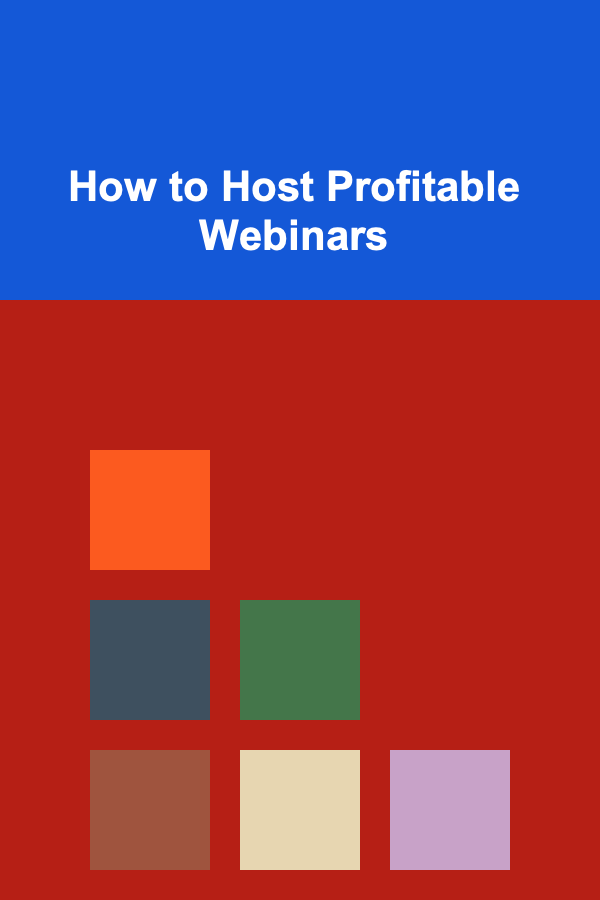
How to Host Profitable Webinars
ebook include PDF & Audio bundle (Micro Guide)
$12.99$10.99
Limited Time Offer! Order within the next:

Webinars have become one of the most powerful tools in the digital marketing landscape. Whether you're a business owner, educator, or thought leader, hosting a webinar offers a fantastic opportunity to engage with your audience, build relationships, and generate revenue. However, just hosting a webinar isn't enough. To turn your webinar into a profitable venture, you need to plan, promote, and execute with strategy and precision.
This comprehensive guide will walk you through the essential steps to hosting profitable webinars. From understanding the fundamental aspects of a successful webinar to implementing advanced strategies for maximizing revenue, this guide has you covered.
Understand the Purpose of Your Webinar
Before diving into the technicalities of hosting a webinar, it's important to understand why you're hosting it in the first place. A profitable webinar is not just a one-time event but an integral part of your overall business strategy. Defining the purpose of your webinar will help you set clear goals and objectives, which are key to creating value for both you and your audience.
Key Objectives of Hosting a Webinar
- Lead Generation: Webinars are an excellent tool for generating leads. By offering valuable content in exchange for attendees' contact information, you can build a list of prospects that you can nurture into paying customers.
- Sales Conversion: Webinars provide a platform for product demonstrations, case studies, and live Q&A sessions. This helps you convert leads into paying customers by showing them exactly how your products or services can solve their problems.
- Brand Authority: Hosting high-quality webinars establishes you as an authority in your field. Sharing expert knowledge, insights, and case studies during a webinar can enhance your credibility and trustworthiness, which can ultimately lead to long-term business success.
- Community Engagement: Webinars foster a sense of community among your audience. Hosting regular webinars allows you to maintain an ongoing relationship with your audience and keep them engaged with your brand.
By identifying your primary objective, you'll be able to create a webinar that serves both your needs and those of your attendees.
Choose the Right Webinar Format
The format of your webinar plays a significant role in its effectiveness and profitability. It's important to select a format that resonates with your target audience while also aligning with your business goals. Here are some popular webinar formats that can help you achieve different objectives:
1. Educational Webinars
Educational webinars focus on providing valuable content and insights. These webinars are perfect for offering tutorials, training sessions, or demonstrations of your products or services. They are a great way to position yourself as an expert in your field and help build trust with your audience.
2. Product Launch Webinars
If you're launching a new product or service, a product launch webinar is an ideal format. During these sessions, you can showcase your product's features, benefits, and use cases. A product launch webinar also allows you to offer special discounts or bonuses to attendees, incentivizing them to make a purchase during the live session.
3. Panel Discussions
Panel discussion webinars feature a group of experts discussing a relevant topic. This format is perfect for leveraging the knowledge of multiple thought leaders, making the session more dynamic and engaging. Panel discussions also provide an opportunity to attract a broader audience by featuring influencers or experts with their own following.
4. Q&A Webinars
Q&A sessions give attendees the chance to ask questions and get answers in real time. This format fosters direct engagement and allows you to address common concerns, objections, or curiosities from your audience. A Q&A webinar is also a great opportunity to showcase your expertise and customer service skills.
5. Workshops
Workshops are highly interactive webinars that focus on teaching participants specific skills. Unlike passive webinars where the audience listens, workshops are more hands-on, with attendees completing exercises or assignments during the session. Workshops are effective for creating deeper connections with your audience and delivering immediate value.
Each of these formats can be tailored to your specific business goals. By selecting the right format, you'll set yourself up for greater engagement and higher profitability.
Plan Your Content Carefully
The content of your webinar is the backbone of the entire event. Well-planned content can captivate your audience, keep them engaged, and, most importantly, convert them into paying customers. Your webinar content should align with your business goals and provide value to your target audience.
Key Content Strategies
- Define the Problem: Start by addressing the pain points or challenges that your audience faces. Clearly articulating the problem sets the stage for presenting your solution (which, of course, can be your product or service).
- Offer Actionable Insights: Focus on providing actionable takeaways that your audience can implement immediately. People attend webinars to learn something useful, so offering value in the form of tips, strategies, or frameworks can significantly increase the likelihood of conversions.
- Tell a Story: Storytelling is a powerful tool for keeping your audience engaged. Share real-life examples, case studies, or customer success stories that demonstrate how your solution has made a difference. Stories humanize your brand and make your content more relatable.
- Create a Clear Call-to-Action (CTA): At the end of your webinar, clearly guide your attendees on the next steps. Whether it's purchasing a product, scheduling a consultation, or downloading a free resource, your CTA should be straightforward and aligned with your webinar's goals.
Ensure that your content is concise and engaging. Attention spans are short, especially in a digital format, so it's important to keep your webinar focused and to the point.
Choose the Right Webinar Platform
Selecting the right webinar platform is crucial for delivering a smooth and professional experience. The platform you choose should be reliable, easy to use, and provide features that enhance engagement. Here are some factors to consider when choosing a webinar platform:
Key Features to Look For
- HD Video and Audio: Quality video and audio are essential for keeping your audience engaged. Poor video or sound quality can quickly lead to frustration and may cause attendees to leave the webinar.
- Interactive Tools: Look for features like live polls, chat, and Q&A to encourage audience participation. These tools foster engagement and allow you to gauge the audience's understanding and interest.
- Screen Sharing: If you're demonstrating a product or walking through a presentation, screen sharing is an essential feature. It allows your attendees to see exactly what you're doing and enhances the learning experience.
- Automated Emails and Reminders: Your webinar platform should allow you to send automated email reminders to registrants. This ensures that your attendees show up on time and are prepared for the session.
- Recording Options: Having the ability to record your webinar is a must. Recordings can be used for future promotions, repurposed into other content, or offered as a lead magnet after the live event.
Popular webinar platforms like Zoom, GoToWebinar, WebinarJam, and Demio offer many of these features. Consider your specific needs, audience size, and budget when making a decision.
Promote Your Webinar Effectively
Promotion is key to hosting a profitable webinar. Even if you have the best content and a fantastic speaker, if you don't have attendees, your webinar will not generate any revenue. Here are some effective strategies for promoting your webinar:
1. Leverage Email Marketing
Email marketing is one of the most effective ways to promote your webinar. Send multiple emails leading up to the event, including an initial invitation, a reminder email, and a last-chance email. Segment your email list to target those most likely to benefit from your webinar, and personalize your messages to increase open rates.
2. Use Social Media
Promote your webinar on all your social media platforms, including Facebook, Instagram, LinkedIn, and Twitter. Share engaging posts that highlight the value of attending and include a link to the registration page. You can also run paid ads on social media to reach a broader audience.
3. Collaborate with Influencers or Partners
Partnering with influencers or industry experts can help you tap into their audience and increase registrations. Consider offering guest speakers, experts, or influencers the opportunity to co-host the webinar, giving them an incentive to promote it to their followers.
4. Create Landing Pages
Design a high-converting landing page that outlines the key benefits of attending the webinar. Include testimonials, speaker bios, and an easy-to-fill-out registration form. Your landing page should highlight the problem your audience faces and how your webinar will help solve it.
5. Offer Incentives
Incentivize people to sign up by offering bonuses such as downloadable resources, access to exclusive content, or discounts on your products or services. Make sure the incentive is relevant and valuable to your target audience.
Engage with Your Audience During the Webinar
Keeping your audience engaged during the webinar is crucial for maximizing its impact. The more engaged your audience is, the higher the chances of converting them into customers. Here are some strategies to engage your audience:
1. Ask Questions
Engage your audience by asking questions throughout the webinar. This can be done through live polls or in the chat. Encourage attendees to share their thoughts, experiences, or challenges related to the topic.
2. Encourage Interaction
Encourage attendees to use the chat feature to ask questions or share their thoughts. Respond to questions in real time to make the session feel interactive and personal. You can also create breakout sessions for smaller group discussions if the platform allows.
3. Share Visuals
Visuals are more engaging than text alone. Use slides, images, videos, and demonstrations to keep the content interesting and help illustrate your points. A well-designed presentation can make complex information more digestible and keep your audience's attention.
Convert Attendees into Paying Customers
The ultimate goal of hosting a webinar is to convert your audience into paying customers. Here are some strategies to increase your chances of closing sales during or after the webinar:
1. Present a Special Offer
Offer an exclusive deal or discount to webinar attendees. This creates a sense of urgency and incentivizes attendees to take immediate action. The offer should be relevant to the content you've presented and provide additional value.
2. Use Testimonials and Case Studies
Share testimonials and case studies that demonstrate the effectiveness of your product or service. Social proof is a powerful tool for overcoming objections and convincing potential customers that your solution is worth purchasing.
3. Follow-Up with Personalized Emails
After the webinar, follow up with personalized emails to attendees. Thank them for attending, provide a recording of the webinar, and include a link to your offer. Be sure to address any questions or objections they may have had during the session.
4. Nurture Leads
For attendees who did not purchase immediately, continue nurturing the relationship through email marketing, retargeting ads, and regular follow-up. Provide additional value through resources like blogs, ebooks, or exclusive content to keep your brand top of mind.
Conclusion
Hosting a profitable webinar requires careful planning, engaging content, and effective promotion. By selecting the right format, creating valuable content, choosing the right platform, and promoting your webinar effectively, you can build a profitable webinar that generates leads, builds authority, and drives sales.
Other Products

Building Long-Term Passive Income with Deep Learning Solutions
Read More
Essential Guide to Buying Pre-Owned Electronics and Getting the Best Deals
Read More
How to Build a Checklist for Holiday Decor for Small Spaces
Read More
How to Light Your Home Like a Designer on a Budget
Read More
Top Thrifty Holiday Decorations Ideas for a Festive and Affordable Celebration
Read More